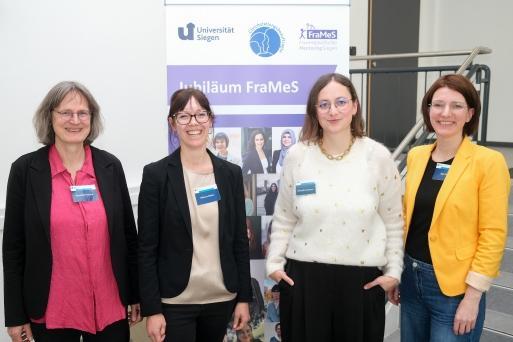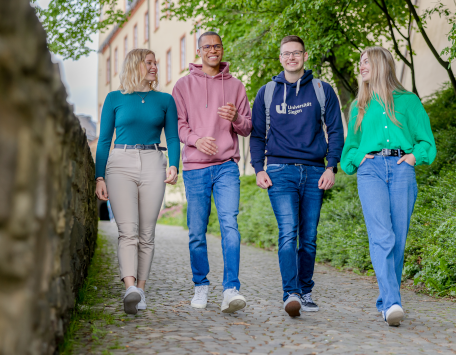What else do you want?
Women are strongly represented among students. Last winter semester, their percentage at the University of Siegen was 55%. However, the higher the career level, the greater the gap between the proportion of women and men. Doctorates, post-doctoral positions, habilitations, professorships: women are underrepresented in science throughout Germany. This was the case 15 years ago when the Women's Mentoring Siegen (FraMeS) program was launched at the University of Siegen. And it is still the case today, even though gender-sensitive reflection has become much stronger and women, including the successful participants in the FraMeS program, show how successful career paths work. "Women-specific support is still necessary. Perhaps less so than 15 years ago, but the problems have not disappeared," emphasized Dr. Elisabeth Heinrich, Equal Opportunities Officer at the University of Siegen and initiator of FraMeS. To mark the anniversary, current and former participants met at the Lower Castle Campus for a celebration, but above all to exchange ideas. After all, networking is an important part of the mentoring program.
According to Dr. Rebecca Weber and Dr. Inga Haase, the two FraMeS project coordinators, the concept has proven its worth. The program is based on three elements: mentoring, training and networking. The participants are accompanied and advised by a mentor for one year. The mentees choose the mentor themselves - either within or outside the University of Siegen. In addition, workshops and seminars are offered for the acquisition of interdisciplinary key qualifications. FraMeS is open to doctoral candidates and post-docs from all disciplines. Over 200 mentees have taken part in FraMeS over the past 15 years. Many of them met again at the anniversary event. "Networking is important to us," says Dr. Rebecca Weber. Through the exchange, you learn a lot about the challenges and opportunities of further career planning. "Knowledge is passed on from one year to the next," adds Dr. Inga Haase.
In her welcoming address, Rector Prof. Dr. Stefanie Reese emphasized how important it is that there is a protected space in which women can exchange ideas without being immediately judged. "Acceptance of performance is unfortunately still dependent on gender, I notice that again and again," said the Rector. She received spontaneous applause when she described a phenomenon that almost everyone in the audience was familiar with: "A woman speaks in a meeting. A man rephrases what she has said and then the other participants in the discussion only refer to the man's statement."
Are these individual aspects or are they rather examples of the problem areas that continue to exist alongside the equally unresolved issues of reconciling children and/or other care work with a (scientific) career? This was further addressed in a panel discussion on the topic of "Excellence in science? The focus was on the demands of excellence and the consequences of attempts to recognize outstanding scientific achievements and, above all, potential. Prof. Dr. Florian Heesch (Popular Music and Gender Studies, University of Siegen), Dr. Elisabeth Heinrich, Prof. Dr. Kathrin Holten (former FraMeS participant, now University of Klagenfurt), Prof. Dr. Andreas Kolb (Vice-Rector for Research, University of Siegen) and Dr. Daniel Müller (House of Young Talents, University of Siegen) took part in the panel discussion. Prof. Dr. Kerstin Ettl (Westphalian University of Applied Sciences) acted as moderator. There was agreement that women's biographies look different and that, among other things, the demand for an uninterrupted academic career is more difficult to fulfill and should therefore be less important as a criterion for excellence. "It is difficult to adequately compare life paths," emphasized Dr. Elisabeth Heinrich. "It is necessary to raise awareness of this and to repeatedly address gender-specific inequalities in appointment procedures."
The author Alexandra Zykunov (Hamburg) had already made this point in a pointed and entertaining way. She read from her new book "Was wollt ihr denn noch alles?" (What else do you want?) and used figures and studies to show where and how women are disadvantaged and how exhausting it is to fight against false expectations - one's own and those of others. "What do we learn from this? Let's just do it the way we want to," Alexandra Zykunov appealed to the women.

